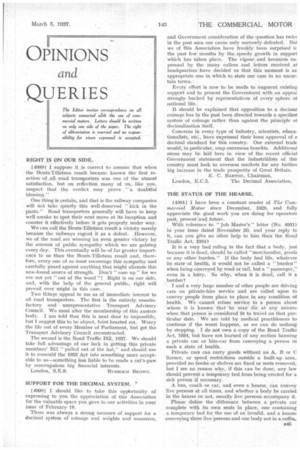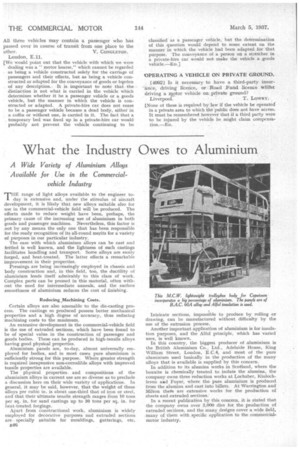OPINIONS
Page 63

Page 64

If you've noticed an error in this article please click here to report it so we can fix it.
and
QUERIES
RIGHT IS ON OUR SIDE.
(49891 I suppose it is correct to assume that when the Bouts-Tillotson result became known the first reaction of all road transporters was one of the utmost satisfaction, but on reflection many of us, like you, suspect that the verdict may prove " a doubtful blessing."
One thing is certain, and that is the railway companies will not take quietly this well-deserved "kick in the pants." Road transporters generally will have to keep well awake to spot their next move at its inception and counter it effectively before it gets properly under way.
We can call the Bouts-Tillotson result a victory merely because the railways regard it as a defeat. However, we of the road are winning -an even greater victory by the amount of public sympathy which we are gaining every day. This eventually will be of far greater importance to us than the Bouts-Tillotson result and, therefore, every one of us Must encourage this sympathy and carefully guard against anything that might alienate this new-found source of strength. Don't "ease up" for we are not yet "out of the wood" I Right is on our side, and, with the help of the general public, right will prevail over might in this case.
Two things appeal to me as of immediate interest to all road transporters. The first is the entirely unsatisfactory and unrepresentative Transport Advisory Council. We must alter the memhership of this austere body. I am told that this is next door to impossible, but I suggest this to be abject, faint-hearted rot. Worry the life out of every Member of Parliament, but get the Transport Advisory Council reconstructed.
The second is the Road Traffic Bill, 1937. We should take full advantage of our luck in getting this private members' Bill " pulled out of the hat," and should use it to remould the 1933 Act into something more acceptable to us—something less liable to he made a cat's-paw by unscrupulous big financial interests.
London, S.E.9. RUSHOLM BROWN, SUPPORT FOR THE DECIMAL SYSTEM.
[4990] I should like to take this opportunity of expressing to you the appreciation of this Association for the valuable space you gave to our activities in your issue of February 19.
There was always a strong measure of Support for a decimal system of coinage and weights and measures,
and Government consideration of the question has twice in the past seen our cause only narrowly defeated. Bid we of this Association have frankly been surprised ir the past few months by the speedy growth in supporl which has taken place. The vigour. and keenness expressed by the many callers and letters received .al headquarters have decided us that this moment is an appropriate one in which to state our case in no uncertain terms..
Every effort is now to be made to augment existing support and to present the Governtnent with an appeal strongly backed by representatives of every sphere 01 national life.
It Should be explained that opposition to a decimal coinage has in the past been directed towards a specified system of coinage rather than against the principle' 01 decimalization itself, " Concerns in every type of industry, scientists, educationalists, etc., have expressed their keen approval of a decimal standard for this country. Our external trade would; in particular, reap enormous benefits. Additional stress may be laid here in view of the recent official Government statement that the industrialists of this country must look to overseas markets for any further big increase in the trade prosperity of Great Britain.
E. C. BARTON, Chairman, London, E.C.2. The Decimal Association.
THE STATUS OF THE HEARSE.
f49911 I have been a constant reader of The Commercial Motor since December, 1928, and fully appreciate the good work you are doing for operators past, present and future.
With reference to " Job Master's" letter (No. 4931) in your issue dated November 20, and your reply to it, can you give no other help to him than the Road Traffic Act, 1934?
It is a very bad ruling in the fact that a body, just because it is dead, should be called "merchandise, goods or any other burden." If the body had life, whatever its state of health, it would not be called a "burden" when being conveyed by road or rail, but a' passenger,:' .even in a lorry. So why, when it is dead, call it a burden?
I and a very large number of other people are driving ears on private-hire service and are called upon to convey people from place to place in any condition Of health. We cannot refuse service to a person about 'whom it is known that he may die at any minute when that person is considered fit to travel on that par'ticular date. We are told by medical practitioners to continue if the worst happens, as we can do nothing by stopping. I do not own a copy of the Road Traffic Act, 1934, but have not learned of any section banning a private car or hire-car from conveying a person in such a state of health.
Private cars can carry goods without an A, B or C licence, or speed. restrictions outside a built-up area, provided no hooks or shelves are fixed or seats removed, but I see no reason why, if this can be done, any law should prevent a temporary bed from being erected for a sick person if necessary.
A bus, coach or car, and even a hearse, can convey live persons at all times, and whether a body be carried in the hearse or not, usually live persons accompany it. Please define the difference between a private car complete with its own seats in place, one containing a temporary bed for the use of an invalid, and a hearse 'conveying three live persons and one body not in a coffin. n45
All three vehicles may contain a passenger who has passed over in course of transit from one place to the
other, V. CONGLETON. London, E.11.
[We would point out that the vehicle with which we were • dealing was a " motor hearse," which cannot be regarded • as being a vehicle constructed solely for the carriage of passengers and their effects, but as being a vehicle constructed or adapted for the conveyance of goods or b9rden
• of any description. It is important to note that the distinction is not what is carried in the vehicle which determines whether it be a passenger vehicle or a goods vehicle, but the manner in which the vehicle is constructed or adapted. A private-hire car does not cease to be a passenger vehicle because a dead body, either in a coffin or without one, is carried in it. The fact that a
• temporary bed was fixed up in a private-hire car would probably not prevent the vehicle continuing to be
classified as a passenger vehicle, but the determination of this question would depend to some extent on the manner in which the vehicle had been adapted for that purpose. The conveyance of a person on a stretcher in a private-hire car would not make the vehicle a goods vehicle.—Eo.1
OPERATING A VEHICLE ON PRIVATE GROUND.
L.49021 Is it necessary to have a third-party insurance, driving licence, or "Road _Fund licence Whilst driving a motor vehicle on private ground? Liverpool. T. LOwaY.
taTone of these is required by law if the vehicle be operated in a private area to which the public does not have access. It must be remembered however that if a third party were to be injured by the vehicle he might claim comperiSation.—ED.




































































































